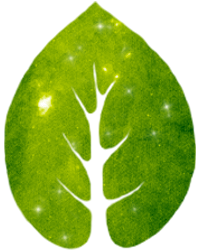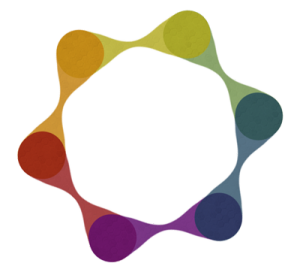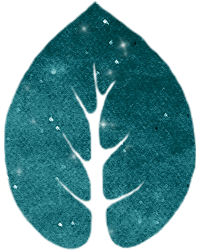
This is the story of how I discovered my 2nd Great Grandmother, Mary Farrar and our biological connection to Alexander Thomas Douglass, her slaveowner, through genetic genealogy. This discovery unfolded while researching my Great Grandfather Ned Farrar and Grandfather Timothy Farrar Sr.
Breaking Through a Brick Wall
Timothy Farrar is my maternal Grandfather and the foundation of my research focuses on this branch of my family. He was born to Ned Farrar and Mollie Williford (Farrar) on September 6, 1900, in Kennett, Dunklin County, Missouri – the 8th of Mollie’s 9 children.
I’d been researching the Farrar family of Kennett, Dunklin County, Missouri off and on for years looking for clues about my Great Grandfather Ned and had hit a brick wall.
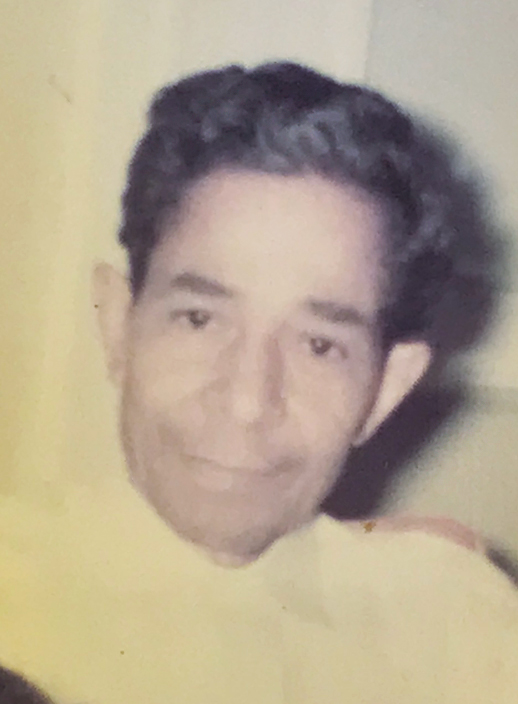
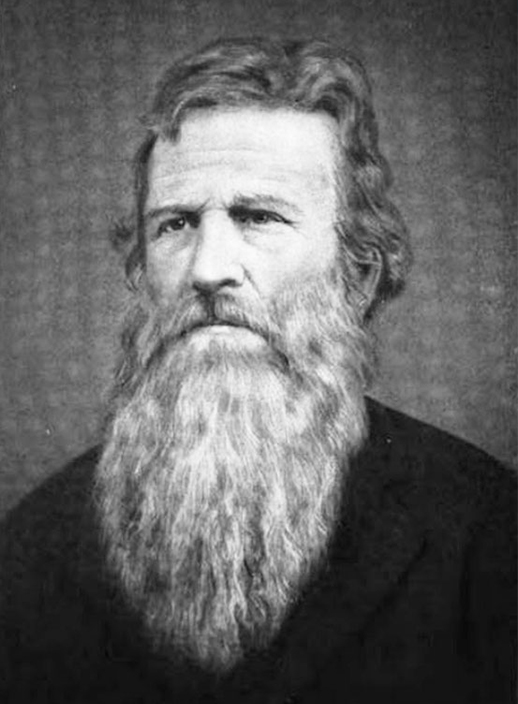
A Little Help from a Fellow Researcher Breaks the Brick Wall

I was beyond grateful to receive this message from a fellow ancestry.com user in 2018 entitled Ned Farrar’s Mother (I’ve erased identifying information about him to protect his privacy). This was the breakthrough I needed to expand on my research of Ned. I often energetically grace him with gratitude for taking the time to share this information with me.
Is this my Ned Farrar?
I intuitively knew this Ned was my Grandfather and I’d just been introduced to my Great Great Grandmother Mary. I had that warm feeling of honor and adoration that comes with finding long lost kin, but the researcher in me required tangible evidence.
The Evidence at Hand
My fellow ancestry.com user emailed this photo of the book referenced in his message.
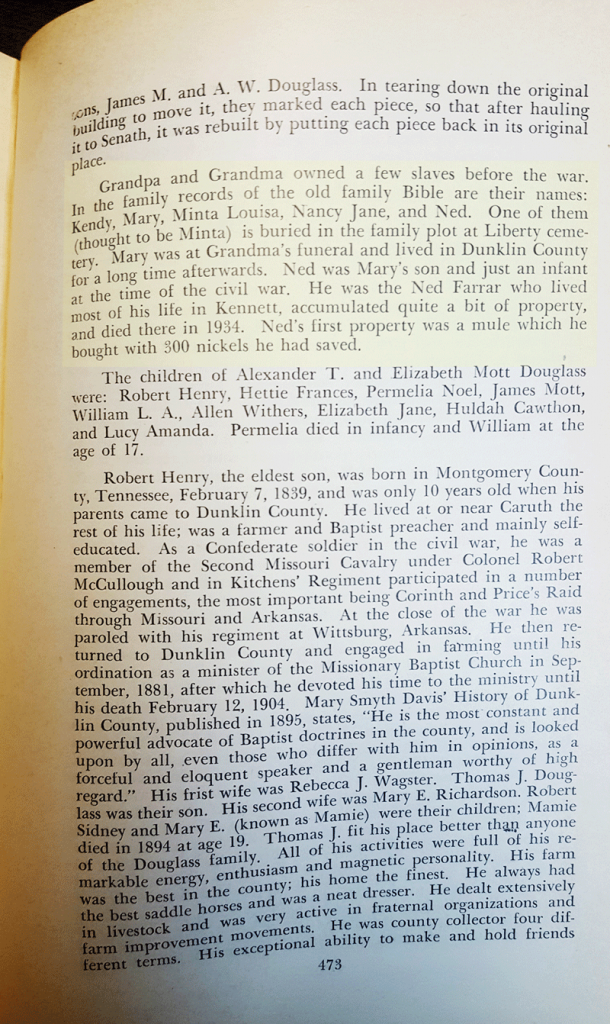
The passage reads:
“Grandpa and Grandma owned a few slaves before the war. In the family records of the old family Bible are their names: Kendy, Mary, Minta Louisa, Nancy Jane, and Ned. One of them (thought to be Minta) is buried in the family plot at Liberty cemetery. Mary was at Grandma’s funeral and lived in Dunklin County for a long time afterwards. Ned was Mary’s son and just an infant at the time of the civil war. He was Ned Farrar who lived most of his life in Kennett, accumulated quite a bit of property, and died in 1934. Ned’s first property was a mule which he bought with 300 nickels he saved.”
Genealogical Research Queries
Is this my Ned Farrar?
I have no pictures of Ned or Mary, however, the resemblance between my Grandfather, Tim, and Alexander Douglass certainly supported a biological connection.
“He accumulated quite a bit of property” aligns with oral family history, and the reference to entrepreneurial spirit was inherited shared by my Grandfather who started and owned several businesses in his lifetime.
His death in 1934 aligns with oral history as well (research note: order a copy of Ned’s death certificate).
Who is Mary?
How did Mary and Ned come to use the Farrar surname?
I have yet to find any record of Mary’s existence aside from this passage from Dunklin County Historical Society v1. I speculate that Alexander may have purchased Mary from the Farrars, who were among the earliest settlers in Kennett, Missouri. Maybe she married a Farrar.
Who were Kendy, Minta Louisa, and Nancy Jane?
How did their lives unfold after Emancipation?
This is a side project in my queue just because giving the silenced and forgotten ones a Voice is why I do what I do. If you’re a descendant of one of these Souls, I’d be honored to help you know their story – just let me know.
And finally, who were Elizabeth Mott and Alexander Thomas Douglass?
The first research task upon discovering the ‘owner’ of a research subject is a review of property and probate records, family bibles and letters, and books (like the one documented above). Slaves were commonly gifted and sold among friends and family, and were divvied up among heirs in wills where they’re usually listed by name. Records from relatives, friends, citizens of their community, and associates can provide valuable clues (as shown above).
Discovering my grandmother Mary requires knowing about the lives of those who enslaved her: Elizabeth and her family, the Motts of Kentucky and A. T. Douglass who was a descendant of the Douglass’ of Bedford County, Virginia.
The Challenges of Researching African Americans from Dunklin County
In addition to the expected challenges of researching enslaved African-Americans, Dunklin County, Missouri is a burned county. All records were destroyed in courthouse fires – one in the 1850s and another in 1862.
Personal records of Mary’s owner, Alexander Douglass, were probably destroyed when Union Soldiers burned every structure on his property during the Civil War in 1862 (known as the Douglass Burn).
I’ve found few transcribed records for African American history in Dunklin County.
Assimilating Historic Facts with Genetic Evidence
All paths lead to Truth in genetic genealogy.
Before further investigation of historical paper trails, I analyzed DNA matches. First, I checked for matches with Farrars living in 19th century Dunklin County, Missouri, and surrounding areas. I found 0 matches.
I then searched genetic matches who were Douglass descendants. I discovered 11 solid matches to descendants of Alexander’s siblings, his mother, and her maternal line – the Noells of Essex, Virginia and the Callaways of Bedford, Virginia.
Our common grandparents are Alexander’s parents (my 3rd great grandparents):
Robert Henry Douglass
(b. October 12, 1778, in Bedford, Virginia – d. 1854 in Dickson, Tennessee)
and
Permelia (sometimes documented as Pamela) Noell
(b. in 1782 in Bedford Virginia – d. March 15, 1847, in Dickson, Tennessee)
This would seem to indicate Alexander is Ned’s father, but to cover every potentiality I checked for the possibility of one of Alexander’s and Elizabeth’s sons being Ned’s father. The oldest son, James M. Douglass was just 12 when Ned was born in 1860, and no matches indicate a biological tie to Elizabeth’s Mott and Withers lines.
Based on all of the above, I concluded Ned Farrar’s father is Alexander Douglass. After a quick review of his family tree, I discovered the fellow Ancestry researcher who provided the breakthrough is my cousin.
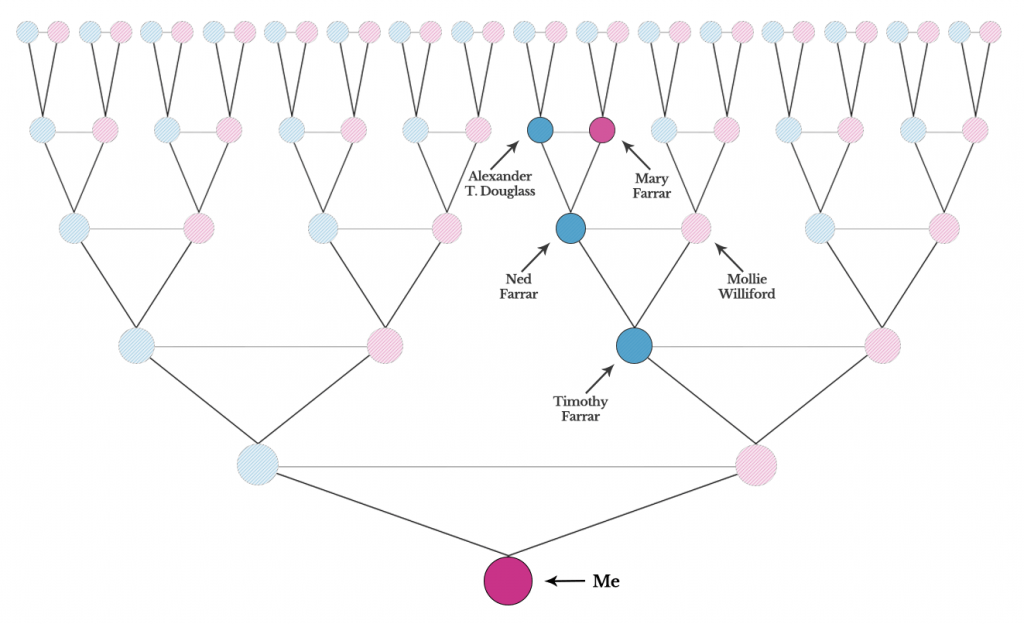
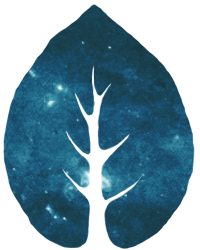
Soul-Centered Research Queries
My primary objective of soul-centered genealogy is to go beyond documented historical facts for a deeper understanding of the real human experiences of research subjects. Discovering the lives of these 3 generations of grandparents and the community and events that affected them inspire a variety of emotions.
I wonder about Mary’s experience of conceiving, carrying, and raising Ned in the shadows of the Master and Mistress.
Enslaved women were often forbidden to identify the father of children conceived by white men. The consequences could lead to separation from their children, torture, or death. These women were also required to honor the feelings of the Mistress. Though these wives knew their husbands pursued sexual encounters with slaves, it wasn’t considered appropriate to actually acknowledge the truth and consequences.
What were the impacts of these circumstances, in addition to the overall trials of being an American slave, on Mary’s sense of self and her experience of being a woman?
How did fellow African Americans in the community regard Mary and Ned?
How did Elizabeth feel and think about this child, who most likely looked a lot like her husband? Consequently, how did she treat Mary and Ned?
As documented above, Mary went to her funeral which may indicate some level of positive connection or a desire for closure. Did Alexander sire children with the other slaves?
Did Ned know Alexander was his biological father? Was he told another man was his father?
Recognizing my Grandfather Timothy’s resemblance to Alexander, I’m guessing the family resemblance was undeniable.
Knowing Ned was his biological son, did Alexander support him in ways a parent naturally would?
And I wonder about the many ways Mary and Ned’s experiences shaped the worldview of my Grandfather, Timothy Farrar.
How Mary and Ned’s Experiences as Slaves Have Affected my Family
As with every human, Ned’s concept of a father and how he parented was influenced by his experience of his father. I personally know the generational inheritances that were passed from Mary and Ned’s circumstances as slaves of the Douglass family. They greatly influenced my grandfather, and in turn, my mother, who took some time to reconcile the fact that her Grandfather was born into slavery and her Great Grandfather was his ‘owner’.
She’s described feelings of sadness and anger – genetic memories coming up for release.
Emotional Inheritences are as Powerful as Genetic Inheritances
Generational legacies born from American slavery are tremendously apparent in American families today and deeply engrained in our customs, beliefs, and the ways we treat one another. The sadness, frustration, and shock often felt at the revelation of our enslaved ancestors’ actual American experience are continuations of what they felt and were forbidden to express, let alone act upon. Likewise, descendants of those who enslaved sometimes cycle through feelings of regret, guilt, embarrassment, and shame as they discover their grandparents.
Acknowledging truths that were forced to be hidden, and breathing life into stories like Mary’s is the only way to evolve past the legacy of pain we’ve been collectively carrying. This is my most heartfelt intention and the most powerful inspiration for documenting and sharing these life stories.
While past events, decisions, and choices can’t be changed, we can each transform our experience of its recollection. Anger may evolve into admiration of our ancestors’ fortitude and the groundedness. Sadness may evolve into sacred respect for their will to live and love, despite extraordinary and systematic efforts to destroy their sense of Self. But first, residual frustration, shame, and sadness must arise before the freedom of release has a chance of transforming powerful emotional legacies that still hold power today.
An Open Invitation to Descendants of Mary Farrar and Alexander Thomas Douglass
An important purpose of this article is to leave digital breadcrumbs for other researchers and family members interested in truly knowing the lives of those who’ve brought us forth. We each have knowledge (oral history, artifacts, DNA samples) to contribute that stands to enlighten our legacies for ourselves and our descendants.
If you see your kin in this tree, please reach out to me!
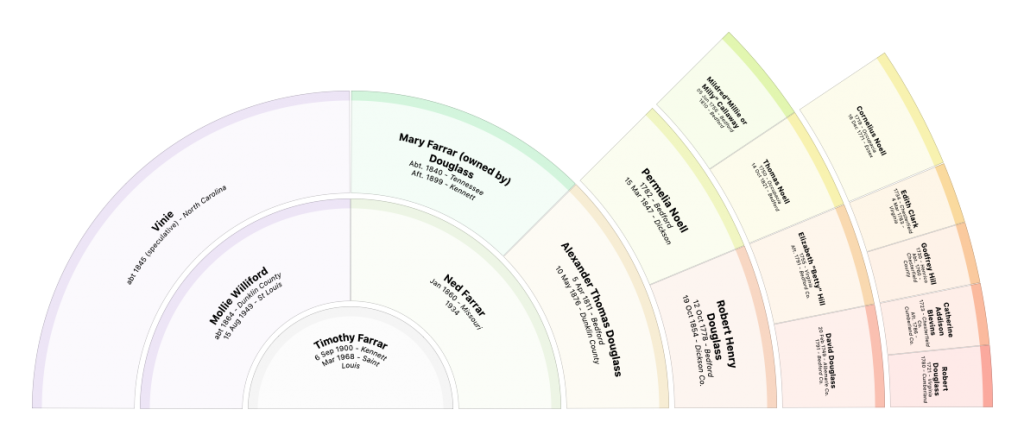
The brick wall inherent in researching African American history is apparent in this family tree. The search for Mary’s and my other grandmother Vinie’s parentage periodically continue through investigation of the families who bought, sold, and traded them. I’m always open to connect and collaborate with fellow direct descendants of Mary Farrar and Alexander Thomas Douglass, as well as those related to the others enslaved by the Douglass family.
People Enslaved by Alexander Thomas Douglass
- Mary Farrar (my 2nd Great Grandmother)
- Ned Farrar (my Great Grandfather – son of Mary Farrar and Alexander Douglass)
- Nancy Jane
- Minta Louisa (said to be buried at the Douglass family plot at Liberty Cemetery)
- Kendy
I have yet to locate evidence related to the lives of Nancy, Minta, or Kendy after Emancipation.
Resources for Continued Genealogical Research of Dunklin County, Missouri
- Dunklin County Historical Society. Vol. 1 by Dunklin County Historical Society (Mo.)
- History of Southeast Missouri: a narrative account of its historical progress, its people and its principal interests by Robert Sidney Douglass

With unconditional Love, respect, and gratitude for Mary, Ned, and Timothy.
They were here and they matter!
My existence is proof.

